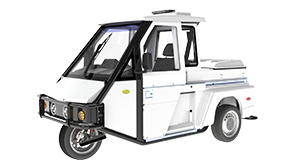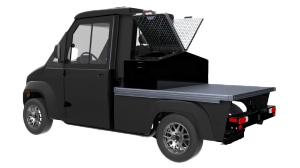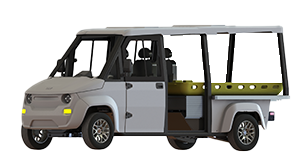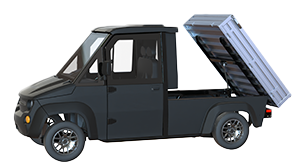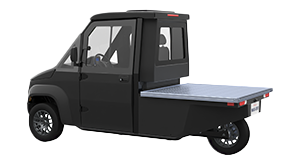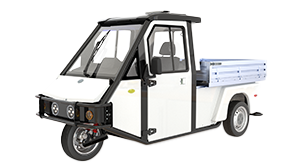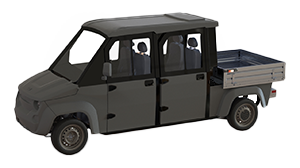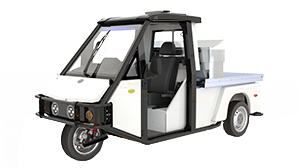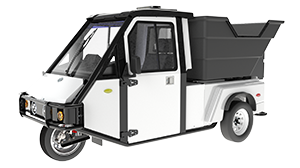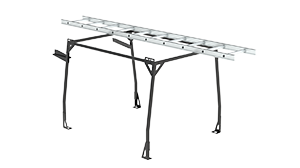Transforming campus transportation is more than just a shift to eco-friendly vehicles; it’s a strategic move towards creating safer, more efficient, and sustainable educational environments. Westward Vehicles’ electric utility vehicles, known for their innovative design and reliability, provide a revolutionary solution. These vehicles not only reduce carbon footprints but also contribute to operational efficiency and safety on campus.
The Need for Sustainable Campus Transportation
Educational institutions face unique challenges in managing campus transportation. Traditional vehicles contribute significantly to the carbon footprint, posing environmental and health risks. However, beyond these well-known issues, there are several less-discussed challenges that underscore the need for a shift to sustainable transportation solutions.
- Environmental Concerns: Traditional campus vehicles, often powered by gasoline or diesel, emit harmful pollutants that degrade air quality and contribute to climate change. The dense usage of these vehicles on campuses exacerbates this problem, creating an urgent need for cleaner alternatives. Electric utility vehicles, powered by advanced lithium-ion batteries, offer a cleaner, quieter, and more sustainable solution.
- Safety Issues: Conventional vehicles are not always designed with the unique needs of a campus environment in mind. The presence of students, faculty, and visitors creates a dynamic and often unpredictable setting. Electric utility vehicles, with their compact design and advanced safety features, can navigate these environments more effectively, reducing the risk of accidents.
- Operational Inefficiencies: Maintaining a fleet of traditional vehicles can be costly and time-consuming. Frequent maintenance, fuel costs, and operational downtimes can strain campus resources. Electric utility vehicles, by contrast, require less maintenance and have lower operational costs, thanks to their efficient electric drivetrains and reliable lithium-ion batteries. This not only saves money but also ensures that the campus fleet is always ready for use.
Westward Vehicles’ Electric Utility Vehicles
Westward Vehicles is at the forefront of revolutionizing campus transportation with its range of electric utility vehicles. These vehicles are specifically designed to meet the unique demands of educational institutions, combining sustainability, efficiency, and safety in a seamless package. Unlike traditional vehicles, Westward’s electric utility vehicles leverage cutting-edge lithium-ion battery technology, offering extended range and reliability that are crucial for campus operations.
- GO-4 Vehicle: The GO-4 is a compact, efficient, and versatile vehicle ideal for parking enforcement on campus. Its small footprint allows it to navigate narrow pathways and crowded areas with ease. Its electric drivetrain significantly reduces tailpipe emissions, contributing to a greener campus environment.
- Max-EV 4-Seater: The Max-EV 4-Seater is another standout option. Designed for both passenger and cargo transport, this vehicle is perfect for campuses with diverse transportation needs. Its spacious design accommodates up to four passengers, making it ideal for shuttle services. The Max-EV UTV’s robust construction and powerful lithium-ion battery provide excellent performance and durability, ensuring it can handle the rigors of daily campus use.
- Max EV 4 Wheel LSV: The Max EV LSV is tailored for university environments where safety, efficiency, and versatility are paramount. This vehicle is perfect for a variety of campus operations including maintenance, security patrols, and light cargo transport.
By focusing on the unique requirements of educational institutions, the electric utility vehicles provide solutions that are not only environmentally friendly but also highly practical and cost-effective.
Benefits of Using Westward Vehicles’ EVs on Campus
Westward Vehicles’ electric utility vehicles offer numerous benefits for university campuses. Their design and technology cater specifically to the nuanced needs of educational institutions, providing a range of benefits that are often overlooked by industry experts.
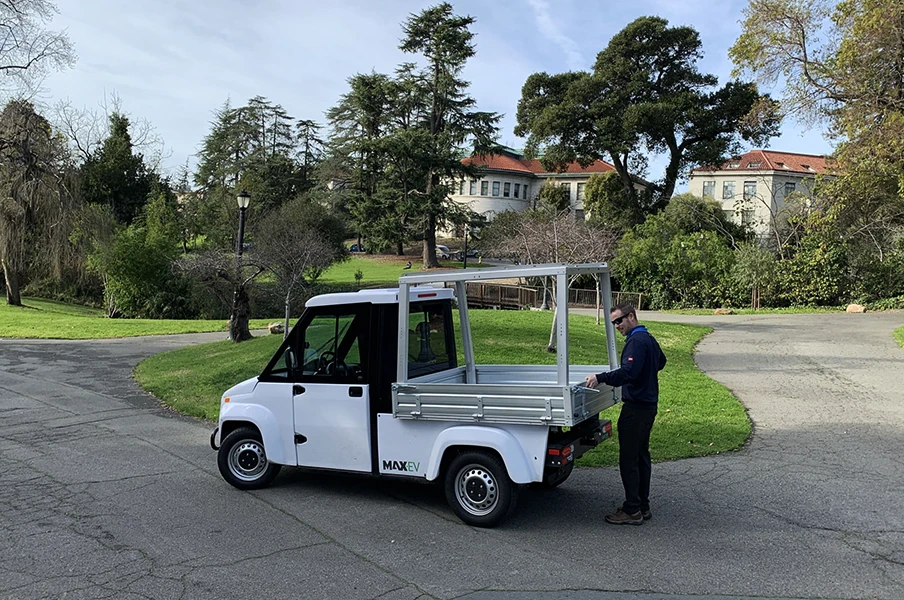
- Environmental Benefits: The shift to electric utility vehicles drastically reduces the carbon footprint of campus operations. By replacing gasoline-powered vehicles with those powered by advanced lithium-ion batteries, universities can significantly cut greenhouse gas emissions. This not only supports global sustainability efforts but also creates a healthier campus environment by reducing air and noise pollution.
- Operational Efficiency: One of the less-discussed benefits of electric utility vehicles is their contribution to operational efficiency. Electric vehicles have fewer moving parts than their internal combustion counterparts, leading to reduced maintenance needs and costs. This translates to less downtime and more reliable transportation services. Additionally, the consistent performance of lithium-ion batteries ensures that vehicles are always ready for use, further enhancing the efficiency of campus operations.
- Cost Savings: While the initial investment in electric utility vehicles may be higher, the long-term savings are substantial. Reduced fuel costs, lower maintenance expenses, and potential government incentives for sustainable practices make electric vehicles a financially sound choice for universities. These savings can be redirected towards other critical areas of the institution, enhancing overall operational efficiency.
- Adaptability and Versatility: Westward Vehicles’ electric utility vehicles, such as the Max EV 4 Wheel LSV, are designed to adapt to a variety of campus needs. Whether for maintenance, security patrols, shuttle services, or light cargo transport, these vehicles offer the flexibility required to address the dynamic requirements of a university campus. Their compact design allows for easy navigation through narrow pathways and crowded areas, making them an ideal solution for diverse transportation challenges.
By integrating Westward Vehicles’ electric utility vehicles into their transportation systems, universities can significantly improve their operational efficiency, safety, and sustainability. This comprehensive approach to campus transportation holds immense potential for transforming how educational institutions manage their mobility needs.
Applications of Westward Vehicles’ EVs in Campus Settings
Westward Vehicles’ electric utility vehicles, such as the Max EV 4 Wheel LSV and GO-4, offer versatile solutions tailored to the unique demands of university campuses. These vehicles are not only environmentally friendly but also highly practical for a wide range of campus applications. Here are some of the primary uses for these innovative vehicles:
- Parking Enforcement: Efficient and effective parking management is crucial for large campuses. The GO-4 vehicle is specifically designed for parking enforcement, featuring a compact size that allows it to navigate tight spaces and congested areas. Its electric drivetrain ensures quiet operation, minimizing disturbance while enabling officers to patrol parking lots and streets with ease. Advanced features like integrated ticketing systems and real-time communication tools enhance the efficiency of parking enforcement operations.
- Maintenance and Landscaping: Campus maintenance and landscaping teams can greatly benefit from the use of Westward Vehicles’ EVs. The Max EV 4 Wheel LSV is ideal for transporting tools, equipment, and personnel across campus. Its robust design and large cargo capacity make it suitable for various maintenance tasks, from gardening and groundskeeping to building repairs and waste management. The electric motor provides a quiet and zero tailpipe emission solution, allowing maintenance activities to be carried out without disrupting the campus environment.
- Security and Patrol: Ensuring the safety of students, staff, and visitors is a top priority for any educational institution. Westward Vehicles’ electric utility vehicles offer an efficient and reliable solution for campus security and patrol duties. The GO-4 and Max EV models provide the agility and speed needed for rapid response while maintaining a low profile. Enhanced visibility features and quiet operation enable security personnel to perform their duties effectively without drawing unnecessary attention.
- Shuttle Services: With increasing campus sizes and the need for efficient transportation, electric utility vehicles are an excellent choice for shuttle services. The Max EV 4 Seater UTV, with its ability to carry multiple passengers, offers a comfortable and eco-friendly alternative to traditional shuttles. Its compact size allows it to navigate campus pathways easily, while the electric motor ensures a smooth and quiet ride. Shuttle services using electric vehicles help reduce traffic congestion and provide a reliable transportation option for students and staff.
- Light Cargo Transport: The need to transport supplies and materials across campus is a common challenge. Westward Vehicles’ EVs, particularly the Max EV 4 Wheel LSV, are designed to handle light cargo transport efficiently. With ample cargo space and a sturdy build, these vehicles can carry a variety of items, from academic materials to food supplies. The electric drivetrain ensures cost-effective and environmentally friendly operations, making it an ideal choice for daily campus logistics.

Future Prospects and Innovations
The future of campus transportation is set to be transformed by ongoing advancements in electric utility vehicle technology. Westward Vehicles continues to innovate, ensuring that our EVs remain at the forefront of this evolution. These advancements promise to further enhance the efficiency, sustainability, and safety of campus operations, offering benefits that are often underappreciated in current discussions.
- Technological Advancements: The integration of cutting-edge technologies in electric utility vehicles is driving their evolution. Innovations such as advanced battery management systems, regenerative braking, and enhanced powertrain efficiency are extending the range and lifespan of lithium-ion batteries. These improvements reduce the frequency of recharging and lower overall maintenance costs, making EVs even more practical for continuous campus use. Additionally, the incorporation of smart features like GPS tracking, telematics, and autonomous driving capabilities will further streamline campus transportation, enabling real-time monitoring and optimization of vehicle fleets.
- Sustainable Materials and Manufacturing: Westward Vehicles is exploring the use of sustainable materials and eco-friendly manufacturing processes to reduce the environmental impact of their vehicles. By incorporating recycled and renewable materials into vehicle construction, and adopting energy-efficient production techniques, the company aims to enhance the sustainability of its electric utility vehicles. This commitment to green manufacturing practices not only benefits the environment but also aligns with the growing demand for eco-conscious products within educational institutions.
- Expanding Applications: As campuses continue to evolve, the applications of electric utility vehicles are expanding beyond traditional uses. Westward Vehicles is developing versatile models that can adapt to a variety of tasks, from mobile labs and food delivery units to emergency response vehicles. These specialized EVs will address emerging needs within campus environments, providing tailored solutions that enhance operational efficiency and safety. The adaptability of electric utility vehicles ensures they remain relevant and valuable as campus requirements change over time.
- Collaborative Partnerships: Westward Vehicles is actively seeking partnerships with universities, technology firms, and government agencies to drive further innovation. These collaborations aim to pilot new technologies, gather valuable feedback, and refine vehicle designs to better meet the needs of educational institutions. By working closely with stakeholders, Westward Vehicles ensures that their electric utility vehicles remain at the cutting edge of campus transportation solutions.
Conclusion
Westward Vehicles’ electric utility vehicles are not just a step towards sustainable campus transportation but a leap into the future of efficient and safe campus operations. By integrating advanced lithium-ion battery technology and innovative design, these vehicles address the multifaceted needs of educational institutions, ensuring a cleaner and more efficient campus environment.
As universities strive to meet sustainability goals and improve operational efficiency, the adoption of electric utility vehicles from Westward Vehicles represents a transformative approach. With ongoing advancements and a commitment to innovation, these vehicles are set to support campus transportation, offering unparalleled benefits that extend beyond traditional solutions.
